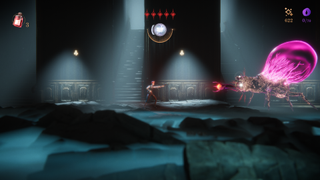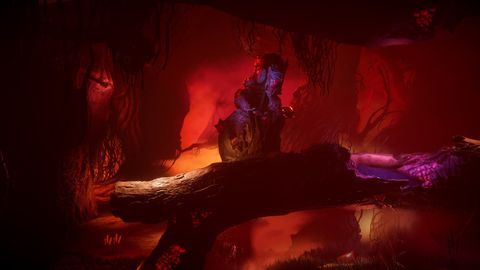Our Verdict
Intriguing puzzles aside, this metroidvania is plagued with systems that seem designed to frustrate.
PC Gamer's got your back
What is it? A 2D Metroidvania game set in an alternate 1920s infused with Lovecraftian lore.
Release date April 27, 2023
Expect to pay $25/£21
Developer Plot Twist
Publisher Rogue Games Inc
Reviewed on RTX 2070, i7-10750H, 16GB RAM
Steam Deck Unsupported
Link Official site
Mysteries are everywhere in The Last Case of Benedict Fox, including a couple on the loading screen. One is why a game like this installed on an SSD should need a loading screen at all. The other is that it makes you stare at a blank wall, which you can scroll around for no clear purpose. Until that is you scroll far to the left and discover a section covered in photos and scribbled notes summarising the story so far.
If that explains what you’re looking at, however, it remains unclear why your view of detective Benedict Fox’s case wall was centred on a corner of bare brickwork in the first place. There’s no ‘A-ha!’ moment in unveiling the truth. It’s just odd. The answer, you’ll learn, is that this Metroidvania revels in the obtuse and the unintuitive, beginning with an approach to storytelling that seems keen to keep you in the dark. Not in a Dark Souls way, mind, pulling you in with subtle worldbuilding, but in a way that feels like something’s gone wrong.

Like its ungainly narrative work, everything about The Last Case of Benedict Fox is somewhat off kilter.
What is clear in the plot here is that the year is 1925, occult magic abounds, and divisions exist between those who dabble and those who reckon it’s trouble. The details of who’s who and what exactly they want are less easy to follow, though, not least because the factions involved are unhelpfully named the Order, the Organization, and the Occult Society. Nor are they formally introduced at the start, so when characters start rambling on about them you might wonder whether you accidentally skipped a crucial cutscene.
As for our Benedict, he’s joined at the hip with a ghostly demonic entity known as the Companion, who helps him out with dark magic powers. Benedict, it transpires, has put considerable effort into tracking down the occult-bothering father he never knew, and the game proper begins as he finally arrives at the old man’s house, only to find him dead. So what happened to Dad, and where’s his second wife? Well, thanks to the Companion, Benedict has the ability to use papa’s corpse to cross into ‘Limbo’, a hellish dimension stuffed with the memories of the deceased, where most of the adventure takes place.
What follows is a fairly standard mix of combat, platform vaulting and forging through a map full of blockages that require key items or ability upgrades to break. You’ll also have to pop back to the house now and again to visit a handful of characters that gradually congregate there, tossing out handy advice or servicing you with boosts of various kinds once you cough up some of their favoured currency.
So far, so fine. Yet like its ungainly narrative work, everything about The Last Case of Benedict Fox is somewhat off kilter. Occasionally that’s a positive—for example the way the mundane process of opening locked doors is transformed into an intriguing, multi-part puzzle. Early on, you’re confronted by locks inscribed with runic symbols, and throughout the first half of the game you collect items and morsels of lore that help you peel back layers of meaning until you decipher the whole system. It’s a great little sub-mystery to unravel.
Mountains of madness

But little else in the game slots together so logically, leaving behind a trail of irritation and unfulfilled promise. Even the visual splendour of the house and Limbo, spectacles of twisted beauty, grates in time. Initially it’s fascinating to observe as typical genre locations – rickety mines or caves dissected by streams of toxic goo—are littered with fragments of everyday life such as old sofas, paintings, and iron gating, artfully fly-tipped into the environments. While there’s visible imagination here, though, the jumble fails to conjure any distinct sense of place, and the intrusion of a few writhing tentacles in the backgrounds isn’t enough to make the surrealness remotely horrifying. Indeed, it’s never really clear what vibe the game is aiming for with its cartoonish take on Lovecraft.
The design of the monsters is hardly likely to provoke a slide towards insanity either. Taking the form of zombified stick men, stumpy gremlins and hovering squid, they’d barely terrorise Scooby Doo. They are, however, maddening to fight, due to the combat’s slapdash rules of engagement. Some lurk just off the edge of the screen, for example, ready to give you what for before you even know they’re present. Others group together and get muddled into a mess of torsos and limbs, until timing parries and knife strikes against them becomes near impossible. And they can slice off all four of your precious health points in quick succession, giving you no time to react between blows.

It doesn't help that Benedict always feels liable to glitch, due to the way he erratically bumps off sloping surfaces, or sometimes rag-dolls dramatically from enemy contact.
Platforming is less deadly but no more refined. Mostly it boils down to double and then triple jumping, since none of your other navigational upgrades require skill or judgement. Yet somehow The Last Case of Benedict Fox struggles to build a satisfying experience even within such narrow confines. It doesn’t help that Benedict always feels liable to glitch, due to the way he erratically bumps off sloping surfaces, or sometimes rag-dolls dramatically from enemy contact. But on top of that, the double jump requires the Companion to shoot out a tentacle to grab onto walls or ceilings and yank you up, which means you suddenly can’t do it if no such latch point is nearby. More of that needless obtuseness.
Even exploration is hampered, by a structure that breaks your journey into small chunks. Each segment of Limbo quickly culminates in locked doors and inaccessibly passageways, which pepper the map with question marks. You’ll spend a significant percentage of your adventure scanning these, trying to figure out which ones are accessible after you’ve found an important item or gained an ability, then teleporting back to places you’ve already been. With luck, you’ll open up another small chunk and collect something else of use there. Or you open up a new path only to be rewarded with another blockage almost immediately, and back to the map you go. Such wasted trips are doubly tiresome given that routes to and from teleport points are often needlessly convoluted.
Amongst all this, there are a few reasonably interesting ideas in The Last Case of Benedict Fox, such as its ink upgrade system, which awards the valuable resource for killing monsters, but only once, removing any incentive to grind. In many more ways, though, this black magic Metroidvania is awkward for the sake of awkward, and if this really is the last case for Benedict Fox, there won’t be a great deal to mourn. In hindsight, the writing was on the wall right from the start.
Intriguing puzzles aside, this metroidvania is plagued with systems that seem designed to frustrate.

Lord of the Rings: Return to Moria is free on Epic and I bet you, like me, are suddenly much more interested in it

Final Fantasy 7 Remake patch levels everyone up and lets you speed up cutscenes to help you replay it before Rebirth comes to PC

In a sea of Game Awards announcements, you probably missed the debut trailer for Covenant, a gnarly 'FPS Soulslike' from veteran shooter devs looking to 'provide more than what seems possible for the price'
